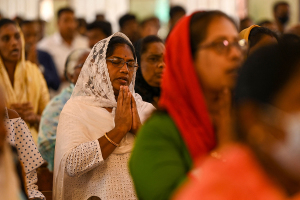Terri Schiavo nonprofit criticizes docu's portrayal of her death by court-ordered dehydration

A national nonprofit named after Terri Schiavo is criticizing a 90-minute documentary released by MSNBC for its depiction of the legal battle between Schiavo’s husband and parents that gripped the nation and resulted in the woman’s death by dehydration after a court ordered her feeding tube removed.
The film, "Between Life & Death: Terri Schiavo’s Story," premiered on MSNBC on Dec. 3 and is streaming on Peacock. According to a description of the movie on MSNBC’s website, the film uses archival footage to “ask universal questions about the government’s role in our private lives and who gets to decide if a life is worth living.”
“This film examines how politicians and activists on the religious right harnessed Terri’s story and the power of the pro-life movement for political gain, laying the groundwork for anti-abortion battles to come,” the description reads.
The Terri Schiavo Life & Hope Network released a statement the day after the film premiered, condemning the documentary for portraying Schiavo’s death through a “false lens of compassion,” noting that she died after enduring more than 10 days of starvation and dehydration.
“We recognize that condensing years, if not decades, of events into a 90-minute video is difficult,” the nonprofit stated. “Still, the final product does not present even a fair portrayal of the brutality that Terri had to endure at the hands of Michael Schiavo and the Florida courts, which enabled his actions.”
Several years after she married Michael Schiavo, Terri suffered a cardio-respiratory arrest in 1990, and she was later diagnosed with a neurological injury caused by a lack of oxygen to her brain, according to terrishiavo.org. After Terri collapsed, her husband subsequently became her guardian.
Terri’s husband argued that his wife wouldn’t want to live with a profound cognitive disability, and in 1998 — a few years after becoming engaged to another woman — he filed a petition for the tube supplying Terri with food and water to be withheld until she died. His wife’s parents and siblings fought to be able to care for Terri, but after years of legal battles, the tube was removed, and Terri died from dehydration on March 31, 2005.
Wesley J. Smith, author and senior fellow at the Discovery Institute’s Center on Human Exceptionalism, broke down what he noted are some of the misconceptions about the case in a 2019 piece for Evolution News.
Smith noted that, in 1992, Michael initiated a medical malpractice suit against Terri’s doctors, where he testified that he intended to care for his wife for the rest of her life, with specialists testifying that Terri would likely live for many years. The length of Terri’s life, as Smith pointed out, was relevant when it came to monetary damages.
“Somehow, the panel was never told that Terri might not live as long as expected because Michael would remove medical treatment,” the author wrote. “Within months of the money being in the bank, Michael tried to take away her antibiotics when she had an infection — thwarted by her family.”
Michael and his brother-in-law testified during court proceedings that Terri had supposedly made it clear that she wouldn’t want to live under such circumstances, with Smith pointing out that even if she had said this, these statements would’ve been made during casual conversations.
“The family presented contrary evidence of conversations Terri had with friends,” he stated. “In any event, as a young woman, Terri unsurprisingly never made a clear, deliberate, and carefully considered decision about what she would want if she ever became so incapacitated.”
Smith also disagreed with the idea that it was only social conservatives who opposed ending life-sustaining measures for Terri, as Ralph Nader, a liberal activist, wanted to save her. The Rev. Jesse Jackson, also a liberal, met and prayed with Terri’s parents in March 2005.
“The federal Terri Schiavo law was one of the most bi-partisan passed during the Bush presidency,” Smith wrote.
“It received unanimous consent in the U.S. Senate, including from Hillary Clinton, Barack Obama, Joe Biden, Tom Harkin (who was a prime mover in support of the bill), Harry Reid, Dianne Feinstein, etc. Forty-five percent of the House Democratic caucus voting also supported the bill,” he continued. “I could go on and on.”
Samantha Kamman is a reporter for The Christian Post. She can be reached at: samantha.kamman@christianpost.com. Follow her on Twitter: @Samantha_Kamman





























